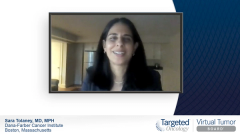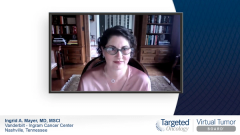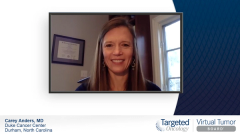
Case 3: Role of Margetuximab in HER2+ Breast Cancer
Experts in the field of breast cancer review the place in therapy for margetuximab.
Episodes in this series

Sara Tolaney, MD, MPH: How have you guys seen the approval for margetuximab? And is it an agent that you will use in the fourth-, fifth- or beyond-line setting for your metastatic patient? Andy, it looks like you have some thoughts there.
Andrew Seidman, MD: We’ve discussed this. Every time there’s a new trial and a new FDA indication, we discuss “should we add it on our formulary, yes or no?” Often the answer is yes. Here, it’s kind of a lukewarm yes. For me, it’s minor incrementalism. I’m still interested in the notion that your optimal dosing forHER2 TKI [tyrosine kinase inhibitor] for brain metastasis could possibly not be the same as for lung and liver and bone. That’s still for me an urgent question that needs to be answered.
Sara Tolaney, MD, MPH: How about you, Carey? Would you consider margetuximab after maybe T-DXd [trastuzumab deruxtecan] or tucatinib?
Carey Anders, MD: I have not had the opportunity to prescribe it myself, but I recently was caring for a patient on a phase 1 study. And we were at eighth-line HER2-directed therapy. And she had received the margetuximab compound with gemcitabine. In that setting when we’re at the fourth, fifth, six line, and we’re looking for a chemotherapy partner with HER2-directed therapy, it’s very reasonable. I was a little surprised that we weren’t using genotyping more for determination of which patients would benefit. I always have to go back and look at which genotype is conferring more sensitivity vs the other. I wish I had a little more biologic rationale to make that decision in an individual patient. But for what we have right now, I would consider it with a chemotherapy backbone that I may ordinarily give with trastuzumab in that setting.
Sara Tolaney, MD, MPH: To your point, Carey, and certainly I could turn to Ingrid and get your thoughts here, is it was very interesting in the SOPHIA data to see that about 85% of people have that F-allele genotype. And they did seem to have a strong trend toward survival benefit, not statistically significant, but a much larger numerical difference favoring margetuximab in that population. Whereas in fact in the V-allele population, it was the opposite, where we saw that the trastuzumab performed better.
That’s the question, it’s only about 15% of the population. Some argue that particular subgroup was imbalanced, where there were more patients in the margetuximab arm who had visceral disease, history of brain metastases, etc. Do you guys find that compelling data? Does it make you anxious to prescribe margetuximab without genotype data? It sounds like, Ingrid, you don’t worry about that sort of opposite trend where trastuzumab did better.
Ingrid A. Mayer, MD, MSCI: The numbers are small. Many patients will fall into the alleles that could be responsive to margetuximab. What was unfortunate in the study design, and unfortunately there’s no way they could have changed it, but like everything we’ve learned about HER2 disease is that maintenance of adequateHER2 blockade obviously matters. Once you take the HER2 blockade out of the picture, things go downhill. The idea behind margetuximab was always to potentially enhance the ADCC [antibody-dependent cellular cytotoxicity] function of trastuzumab, and that does it well. I wonder if we would have seen a stronger overall survival trend, or even a statistically significant difference, if within the study, one was able to maintain margetuximab and just change the chemotherapy partner at progression, which was obviously not done. What I’m wondering now that the drug is out there, and let’s say I’ve already exposed my patient to THP [docetaxel, trastuzumab, and pertuzumab], T-DM1 [trastuzumab emtansine], trastuzumab deruxtecan, and tucatinib. I’m still yet to use gemcitabine, vinorelbine, possibly even eribulin, whatever, and I use it with margetuximab at that point. Do I need to go back to trastuzumab, or can I just keep it going and possibly see a composite better survival if I did that? I don’t think there’s going to be a trial looking at this. But to me it’s tempting to think that that could have made a difference, because I agree, it’s incremental. But this was a solid third-line trial, and in the third line things don’t respond and last as long. I think the data are positive for PFS [progression-free survival]. And because of the trend in OS [overall survival], I really wonder if you keep it on board, is that trend going to become an actual overall survival advantage?
Sara Tolaney, MD, MPH: We certainly haven’t seen the final OS data either.
Ingrid A. Mayer, MD, MSCI: Yes, but the final OS data are meaningless because as I said, they stopped the drug after that interval and never continued it. I think that’s where that would have made a difference.
Andrew Seidman, MD: I’ll come back to incrementalism. I agree that in absence of doing HLA [human leukocyte antigen] genotyping to enrich the population to benefit potentially, I’d be curious at what a pharmacoeconomic analysis will show in terms of the incremental gain in PFS versus the incremental cost over generic trastuzumab.
Carey Anders, MD: For a biosimilar, right? I would envision many of your centers have also moved to biosimilars.
Sara Tolaney, MD, MPH: And now you can give subcu [subcutaneous] trastuzumab or use biosimilar trastuzumab, there are lots of different ways that can be done. I will say there is work ongoing to further think about this in the preoperative setting in the MARGOT trial, which is looking at THP versus TMP, so a taxane with trastuzumab, pertuzumab vs taxane, margetuximab, pertuzumab. But it’s only restricted to the F-allele genotype. They did make that decision up front, and we’ll be able to ascertain differences in terms of pCR [pathologic complete response] as well as longer-term outcome. We’ll learn more here, and it’s certainly an interesting drug. But I think, again, it goes to show you about all the choices we’re continuing to get in the HER2 space and many more to come, and this is a tremendous benefit to our patients to continue to have so many options, even if we don’t have all the right answers for optimal sequencing strategies, and we have a lot to learn.
Thank you so much to all of you for your very thoughtful comments and discussion today. We really enjoyed it, and it goes to show how much exciting work is being done out there. To our viewing audience, thank you for joining us for this Targeted Oncology Virtual Tumor Board® presentation. We hope today’s discussion was a valuable use of your time, and that you acquired some practical knowledge that you can take back to your clinic. Thank you all so much.
Transcript edited for clarity.












































